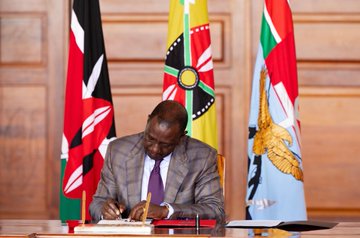Merit did not count in the hiring of Principal Secretaries as some earned their jobs after contributing to Ruto’s campaign or were allies or friends of his close political associates
By THEDISPATCH.DIGITAL REPORTER
Principal Secretaries (PSs) in ministries could face termination as President William Ruto looks for ways to appease the restive youth population that has put his government under unprecedented pressure. While Cabinet Secretaries (CSs) have already faced the axe, PSs have so far been spared, primarily to keep government operations running rather than due to their trustworthiness or competence. The public’s lack of awareness about their roles has shielded them from scrutiny, despite being the actual drivers of government operations behind the scenes.
Sources indicate that although Ruto acted decisively by dismissing all Cabinet members except Musalia Mudavadi, questions persist regarding the continued service of Principal Secretaries. As the real engines of government, responsible for administrative and financial management, their roles are crucial, yet they’ve largely escaped accountability.
“As executive heads of ministries, PSs actually drive and manage corruption in the ministries,” says Johana Okello, a former civil servant. “Nothing can go on without their say-so or knowledge. They direct the procurement officers, they’re in charge of budgets, and even the President, if he wants to steal from ministries, he has to pass through them. For corruption to stop, it has to start with them going home.”
Many current PSs were not selected based on merit, despite advertised posts and apparent interviews, but rather on connections and political favoritism. Some were campaigners and financiers for Ruto, while others were friends of influential politicians. Politicians often forwarded names to Ruto’s aides like Farouk Kibet, who then passed them on to the appointment committee. This lack of familiarity and trust in these appointees has contributed to Ruto’s inability to fulfill his numerous promises, as he lacks a competent support team at the executive level.
“Some of these people don’t understand how government works,” reveals Patrick Mwangi, a civil servant in Community, Nairobi. “They don’t know what is expected of them. Many of them invited friends and relatives to take up tenders, seeing it as an opportunity to make quick money. Consequently, project costs have soared, services have become more expensive, and procurement has been restricted to their networks. We haven’t had an effective government since Ruto’s election because these are crooks in suits and ties.”
Firing the PSs could help Ruto regain some legitimacy and redefine his leadership path, potentially bolstering his chances for another term. However, the process of recruiting new PSs remains unclear. Ruto might need to give Ministry Directors, who are career civil servants and currently Authority to Incur Expenditure (AIE) holders, a free hand to manage ministries if PSs are dismissed before new Cabinet Secretaries are appointed, a process that could take up to three weeks due to the necessary vetting by the National Assembly.
